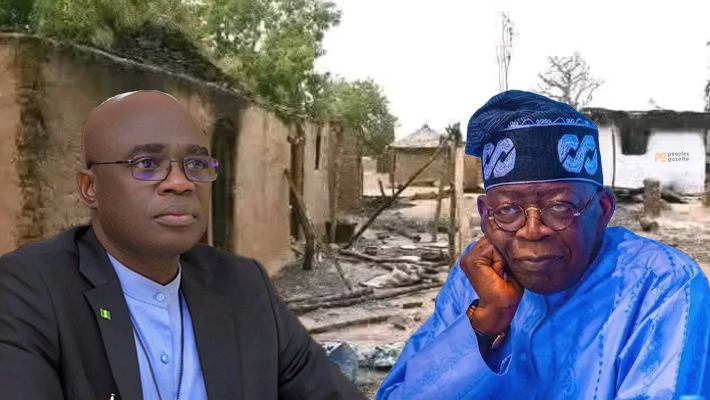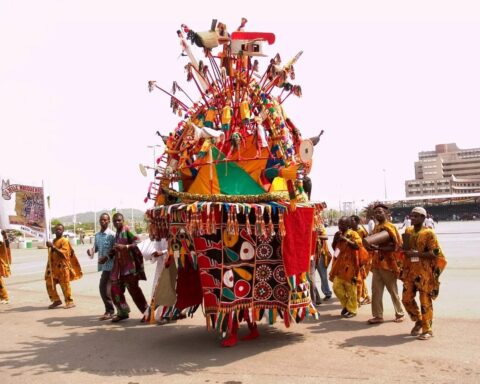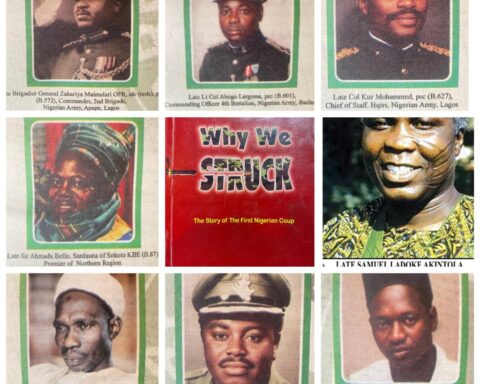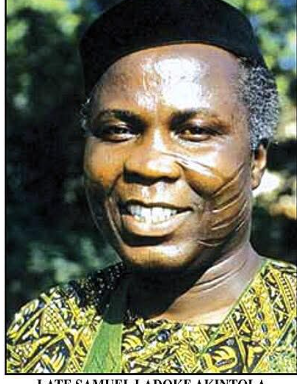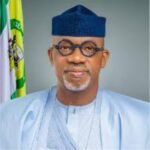By Stephanie Shaakaa, in Makurdi
WHEN President Bola Ahmed Tinubu arrived in Benue today, the smoke had cleared, but the grief had not. Children once again lined the roads to wave not for joy, but out of ritual. Behind them, mass graves still held heat from freshly turned earth. The president came, not to a celebration, but to a cemetery dressed in daylight.
Yelewata was his first stop, a name now etched into Nigeria’s long scroll of avoidable massacres. Over 200 people murdered in one night. Burnt alive. Hacked in their homes. It wasn’t just a community that died, it was the illusion of protection. And yet, what Benue got was not thunder, not resolve, but routine.A prayer, a hospital visit, a meeting. A tour, not a turning point.
Walking through a landscape scarred by silence, soot, and sorrow.Yelewata the site of one of Nigeria’s bloodiest recent massacres. Entire families perished in their sleep. Gunmen descended on the village with petrol bombs and bullets, turning homes into furnaces, and streets into graveyards.
Tinubu arrived late, but not too late to see what remained, ashes where kitchens once held laughter, school shoes scattered beside bloodied paths, and eyes too many eyes still wide with fear.
They swept the blood, but the stench lingered. He bowed his head for a minute of silence. But the dead were already silent. What the living craved wasn’t another bowed head. It was help.
At Benue State University Teaching Hospital (BSUTH), the president met with survivors. Children with gauze-wrapped limbs. Mothers who couldn’t stop trembling. Men stitched together by trauma, not just thread. Tinubu touched hands, nodded, promised federal support. Cameras flashed. He moved on.
At the Government House, he was joined by top officials, among them SGF George Akume and NSA Nuhu Ribadu. Before traditional rulers and stakeholders, Tinubu offered assurances: a peace resolution committee would be set up; land would be provided for ranching; a radio station would be established for crisis briefings and orientation. He told Governor Hyacinth Alia that leadership within the APC must be inclusive. That Benue needed unity. That this tragedy, somehow, could be turned into economic opportunity.
And yet, beneath the words, there was an emptiness.
For a state that has buried over 700 victims in the first half of 2025 alone there were no declarations of a state of emergency. No calls for military reinforcement. No promises of justice. No visit to the mass grave sites, or IDP camps. No compensation plan for survivors. Just rhetoric layered over ruins.
Benue has become a morgue with no wall clocks. Time has stopped here. And still, every month, fresh graves are dug.
SGF George Akume recently came under fire for saying.“It may not be fair to hold security personnel responsible for what has happened in Benue.” His critics say he is protecting a system that has failed. But look closer. Akume, as SGF, has access to real-time security intelligence. Perhaps his words point not at the guns on the ground, but at the silence in Government House. At the leadership vacuum that allows evil to roam free.
Governor Hyacinth Alia, elected with great hope, has grown increasingly distant. In times of terror, he rarely shows up in person. His public remarks are often terse, his presence scarce. Most alarmingly, he has refused to enforce the anti-open grazing law one of Benue’s boldest defenses against armed herders. This legal tool, enacted after years of struggle, could have deterred attackers. But the governor has shelved it, choosing convenience over courage.
Worse still, he has discouraged the people from defending themselves. This is not just tone-deaf. It is dangerous. Self-defense is not a crime. It is a right. Only the dead have no right to self-defense. A governor who truly understands public policy would educate citizens on lawful, responsible protection not tell them to die quietly.
This is the context Akume may have been hinting at. Not to absolve the military, but to ask: who failed to ring the alarm? Who refused to activate the shield of law? Who walked away while villages burned?
Today, Tinubu asked for land to build ranches. But will it be provided? He suggested a radio station for briefings. But who will run it? He proposed a peace committee. But how do you convene peace when no justice has been served?
Benue’s problem is not the absence of good ideas. It is the absence of political will.
The presidential visit brought attention but it did not bring thunder. No sweeping reforms. No executive orders. No major shifts in federal posture. Tinubu’s tone was mild, measured, statesmanlike but also, disappointingly, safe. And Benue is not safe. Benue is bleeding.
As the president’s convoy departed and the applause faded, many were left with the same question echoing through the stillness of camps and villages.
Will Benue ever bury its dead without also burying the truth?
shaakaastephanie@yahoo.com
Follow us on all social media platforms @dailyquery for news and analyses around the globe.
